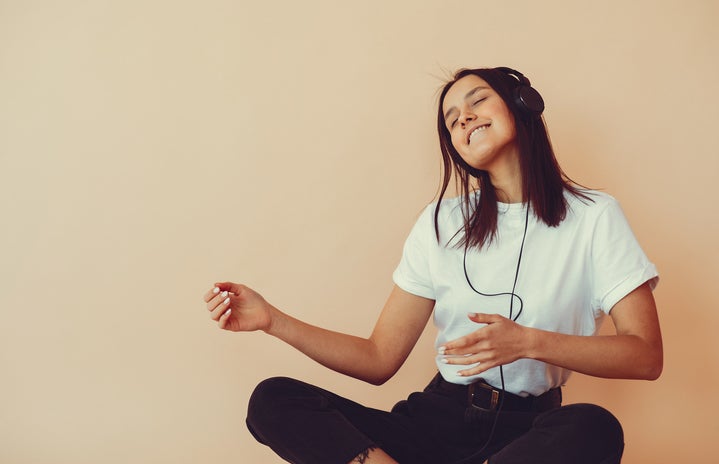When you hear the word “romanticize,” you might think of falling in love. You might think of the cheesy rom-coms that we grew up on, of the clever meet-cutes and the sweeping idealism that filled the screen. So often in the movies, the main romance comes at a trying time in the protagonist’s life, so that it becomes this one shining beacon that they can look forward to, and somehow revolving around it solves all their other problems. I don’t mean to sound cynical, because falling in love is something filled with hope and wonder, but I think those movies did us a great disservice in suggesting that happiness is something that happens to us. It’s not always a romance either, maybe it was a sudden relocation due to their job that leads them to discover new passions or new next-door neighbors that end up becoming their best friends. The spontaneity and unpredictability of life is a mysterious and oftentimes wonderful thing, and I’m not attempting to degrade that. However what I am saying is that sentiment can easily morph into the idea that we are dependent on life, on outside situations, for our happiness.
Many people operate under the philosophy, “If it’s meant to be, it will be.” While that is true to a certain extent, I believe it’s true for things that are outside of our control, the decisions that are out of our hands. But it’s just as easy to use this as an excuse to stay complacent. It’s a form of self-handicapping, or the idea that we purposely put obstacles in our way so that if we fail, we can blame it on them, but if we succeed, we must be extraordinary. Adopting this mentality of “if it’s meant to be, it will be” for major events in our lives is comforting. It allows us to have something else to blame when we don’t get the things we desire, and if we do get them then our desires are reaffirmed all over again. This is such an easy mentality to have, especially when struggling with difficult life events, such as Covid-19. Over the last year, this was definitely my mindset the majority of the time. I felt so helpless in the wake of something as all-consuming as the pandemic, and I felt like I didn’t have any control over my life. I was in a deep depression, so the thought of having to take action in my life was daunting, to say the least, and believing that I didn’t have control over aspects of my own life was reassuring when I needed it most. But it wasn’t until I realized just how much I was missing out on that I was able to gain my new perspective:

Happiness isn’t something that happens to you, it’s something you create. I spent so long waiting to get better, wondering when I would get excited about life again. I thought that I wouldn’t be happy again until the pandemic was over, and I was back at school, back with friends, just generally in a different situation. But getting better, making progress, getting happier, wasn’t contingent on something that would happen to me, it was an active process that I had to start. At that point, I had no motivation to do just about anything, so I wasn’t ready to pull myself up and start looking at the big pieces in my life that needed help. I had to start small. Very small. So small that it often made me feel pathetic for not being able to do more. But those smallest steps were the most crucial.
For me, the most important way that I started to try and take an active role in my own happiness was by romanticizing my life. I had to turn what was boring and monotonous into something exciting that I could look forward to. I had to turn the ordinary into extraordinary, and the bland into beautiful. I started listening to music constantly. When I was studying, brushing my teeth, alone in my room, I always had something playing. And it wasn’t a “play sad music when you’re sad to feel worse” situation. I brought back songs that I hadn’t listened to in years. The ones that I screamed my lungs out to when I was 14, that brought me back to such a nostalgic place. I started spending even just a few minutes outside, feeling the sun on my skin and breathing the fresh air. I picked flowers I thought were pretty and kept them on my bathroom counter so that I would start each day by seeing them. I started thinking about eating as not something I had to do, but that I wanted to, and looked forward to the smell that came with making breakfast.
Little by little, I turned my mundane routine into something that brought me joy. I stopped waiting for something to happen to me that would make me happy, and instead, I manufactured my happiness. Idealizing everyday situations may seem foolish, and by no means would I describe myself as an optimist, but playing an active part in my happiness and progress is when I started to get better. I had to reshape my life into one that I was excited about. My days over the last year have not changed dramatically. I’m still living at home, doing classes online, not seeing many friends or family in person. My routine has remained fairly intact. But my mindset has completely shifted, to the point where I feel like I’m living a completely different life than I was. I stopped waiting. I stopped thinking that happiness and growth were something that I was just going to find, something that was just going to happen to me. I know it sounds intuitive, but sometimes the simplest concepts can be the most difficult to execute. Romanticizing my own life allowed me to take an active role in my progress, and I finally started moving forward. I hope to continue to work on making my happiness and creating a life I am proud to live and proud to have built myself.



